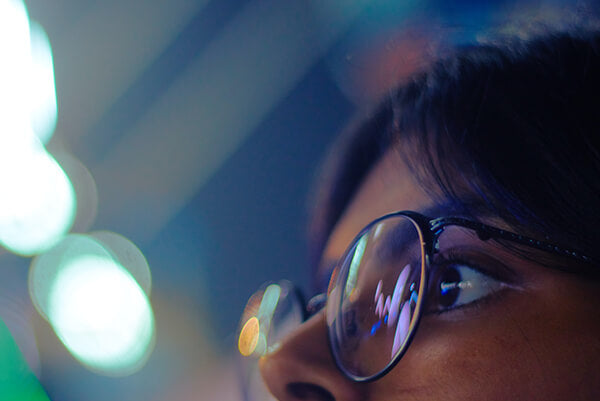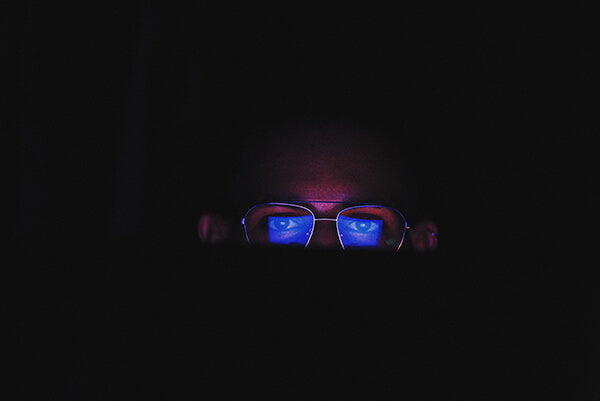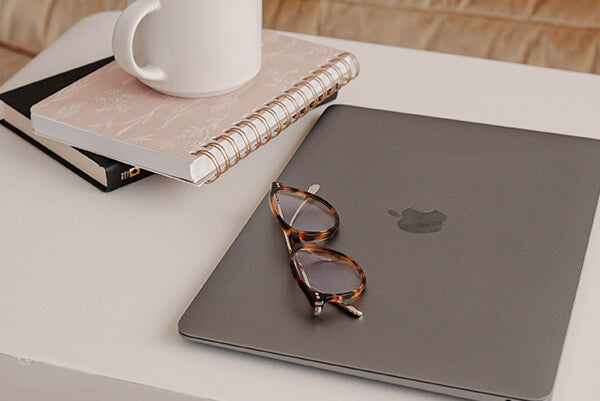Take a look around you. You’re surrounded by blue light and get exposed to it on a daily basis. The sun is the greatest source of blue light but if you’re indoors, your exposure to it will be due to fluorescent lighting, LED technology, digital screens (smartphones, TVs, etc.) and other electronic devices.
It’s safe to assume that it’s not something you consciously think about on a daily basis since it’s so ubiquitous and intangible, but it’s important to understand what it is, how it affects you and what you can do about it.

What is Blue Light?
Let’s start by looking at the electromagnetic spectrum, which refers to the entire range of light that exists in our world. It contains several categories of different wavelengths (listed in order of highest to lowest frequency): gamma rays, x-rays, ultraviolet (UV) rays, visible light, infrared light, and radio waves.
So where does blue light fall on the spectrum? Blue light is a range that exists on the visible light spectrum with a wavelength between 400-525 nm (nanometers), making it high-energy visible light. The shorter the wavelength, the higher the energy.
Is Blue Light Beneficial or Harmful to Us?
The good news is that there doesn’t exist conclusive scientific evidence to suggest blue light directly damages the eye (its permanent effects on the eye and vision are still being studied). Aging, smoking, cardiovascular disease, high blood pressure, and being overweight have a much greater effect on macular degeneration or blindness.
However, it doesn’t mean that it’s not harmful. Blue light has been proven to cause digital eye strain and disrupt our circadian rhythm (aka sleep-wake cycle), both of which have a negative impact on our health overall.

With regard to our circadian rhythm, blue light is a necessary part of everyday lives. Blue light helps your body regulate natural sleep and wake cycles, which can, in turn, boost alertness, heighten reaction times, elevate moods, and increase the general feeling of well being.
Interestingly enough, if a child doesn’t get enough exposure to sunlight, it could affect the growth and development of their eyes and vision. Early studies show a deficiency in blue light exposure could contribute to the recent increase in myopia/nearsightedness.
As you can see, blue light from the sun, a natural source, can be quite beneficial to us.
However, excessive exposure to artificial blue light, for example, spending a lot of your time in front of a screen, is something you want to avoid for the benefit of your health. The truth is the naked eye does a poor job of blocking blue light, which can be harmful when it comes to artificial sources.
We’ve all been there with digital eyestrain, otherwise known as computer vision syndrome. There are moments when we stare at our phone or computer so long that our eyes feel dry, tired and itchy. We may even experience blurred vision, painful headaches or migraines and in more severe cases, nausea, because of this prolonged exposure to digital screens.
In Canada and the US, people of all ages experience symptoms of digital eye strain. Sadly, more and more children are also experiencing digital eye strain as technology has become an indelible part of childhood play and learning.

For those who need to spend most of their days on their computers and phones because their jobs depend on it, unfortunately, they’re unable to eliminate the presence of digital screens from their lives.
Furthermore, when blue light penetrates our eyes, it suppresses our melatonin secretion. Melatonin is a hormone released by the pineal gland that helps regulate our circadian rhythm or internal biological clock.
Before smartphones and computers entered our lives, we spent our nights in relative darkness. But now, it’s common to spend time on our phones, a harsh glow emitting from the screen, before going to bed. All that artificial blue light is tricking our minds into thinking it’s daytime (the same way sunlight does), which is generally when we’re supposed to be awake and going about our days. As a result, we have a much tougher time falling asleep.

Sleep deficiency or deprivation has can affect your health in various ways. The more serious the sleep deficiency, the more severe the health problems. It can lead to heart disease, kidney disease, obesity, weakened immunity, depression, increased risk of injury and much more.
Tips for Minimizing the Harmful Effects of Blue Light
Thankfully, the negative impact that blue light has on our bodies are temporary and can be solved in many ways.
The most obvious and best way to do this is to look away from your screen often. Get up, take a break by getting a snack, going for a walk or doing some exercise. Even closing your eyes for a few moments will allow them to relax. You can do work in intervals of time (the length will depend on what works best for you) and take short breaks in between so your eyes can rest.
Even if you don’t step away from your device, you can give your eyes a rest by blinking more often. It sounds silly, but when concentrated on our screens, we don’t blink as much as we do in other circumstances. Be mindful of it to ensure your eyes are comfortable and avoid blurred vision.
Adjusting your screen settings is also a great way to reduce blue light exposure. Simple things like turning down the brightness of your screen, adjusting the contrast of your device and switching to night mode if you’re looking at a screen in the dark will significantly reduce problems related to blue light.

And of course, to take reducing blue light exposure to the next level, you should implement the above-mentioned solutions and wear blue light reading glasses.
Why Should You Wear Blue Light Reading Glasses?
Specialized blue light reading glasses will greatly reduce digital eye strain because of the fact that they filter out most of the blue light that is emitted from your screen. Not only that, but they reduce glare and increases the contrast on digital screens. Even if you don’t require corrective lenses, you can still take advantage of non-prescription blue light reading glasses.
While the best way to solve digital eyestrain is to stay away from digital screens as much as possible, if you absolutely have to spend a lot of time on your phone or computer (e.g. for your job, to keep in touch with loved ones, helping your kids do their homework etc.), you should wear blue light reading glasses whenever you’re in front of a screen. Doing so allows you to spend more time looking at a screen because your eyes don’t feel as strained and are more comfortable thanks to the decrease in blue light exposure.
They can also be helpful in maintaining a regular and healthy sleep-wake cycle since they can greatly reduce the amount of blue light, which suppresses melatonin, that penetrates your eyes.
For high-quality glasses with state-of-the-art technology, ANRRI’s blue light reading glasses are the perfect choice. Not only do they filter out up to 90% of blue light, their lenses are covered in an anti-reflective coating that eliminates glare to make your eyes feel more comfortable.
What’s more, they don’t have a dark yellow tint that blue light blocking lenses from other brands have. Not only are yellow lenses unappealing and/or unfashionable to many, but color perception is also completely distorted making everything look yellow.

How to Choose the Perfect Blue Light Reading Glasses for You
Should you choose to wear blue light reading glasses, there are a few things you should consider to ensure that you get eyewear that properly address your needs:
• Do you require corrective lenses?
• If you do, have you gotten a recent eyewear prescription from your optometrist?
• Are you nearsighted (far-away objects are blurry) or farsighted (nearby objects are blurry)?
• Do you prefer lightweight glasses?
• What kind of style are you going for?
• Glasses should rest comfortably on the bridge of your nose and shouldn’t touch your cheeks.
• Make sure the arms of the glasses aren’t too tight around your temples.
Blue light is an important part of our lives, but with technology being so entwined in our daily routines, we need to find ways to reduce our exposure to it. Luckily, there are many ways to do this, including the use of blue light reading glasses. They’re a simple, easy-to-implement solution that reduces digital eye strain and helps us maintain a healthy sleep-wake cycle.








































